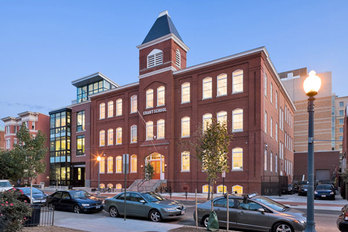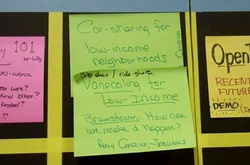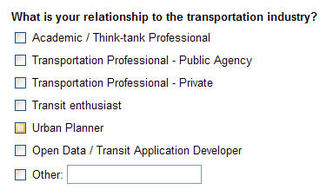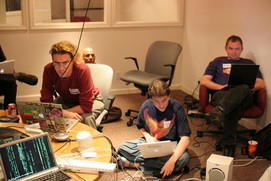Transportation Camp - An Unconference
"Transportation Camp is an "unconference" bringing together transportation professionals, technologists, and others interested in the intersection of urban transportation and technology. TransportationCamp came to Washington DC on January 21, 2012, after two successful Transportation Camp events in 2011 (East and West). Transportation Camp DC was organized by OpenPlans, the Mobility Lab, part of Arlington County Commuter Services, and Greater Greater Washington."
"Transportation Camp is an "unconference" bringing together transportation professionals, technologists, and others interested in the intersection of urban transportation and technology. TransportationCamp came to Washington DC on January 21, 2012, after two successful Transportation Camp events in 2011 (East and West). Transportation Camp DC was organized by OpenPlans, the Mobility Lab, part of Arlington County Commuter Services, and Greater Greater Washington."
Transportation Camp East - 2011
To gain a sense of Transportation Camps held in New York City and San Francisco, play the videos on the right. I attended the NYC camp. There were about 300 attendees. The program began with a panel:
The luncheon program featured:
Transportation camp is a refreshingly unique conference experience. The unconference format means the experience is marketed to prospective participants, who are asked to read “How TransporationCamp Works: The Essential Guide.” Further, attendees are enlisted to use social media to share ideas about prospective sessions beforehand. Participants offer their session choices in a marketplace of ideas. People move between sessions as they desire. It does not matter how many people come to a session, if they are interested enough to engage the topic, it is time well spent. Transportation Camp DC - Jan 2012 The School Without Walls. Image lacks scaffolding & ice of Jan 21.
On Saturday, Jan 21, 2012, I attended Transportation Camp, DC hosted by Open Plans.org. Camp was a pure unconference - no panels or keynote. There were 40 concurrent sessions over four 1-hour sessions. I participated in three sessions - "Car-share, Rideshare, Vanpool for Low Income Neighborhoods - a brainstorm" (see Note #1 below), "Mapbox: Fast Beautiful Open Source Maps - a workshop", "Blogs & Transit Advocacy - a discussion" and hosted a session "The Business of Selling Mobility Solutions to Customers- a discussion".
Camp is fully engaging. Time is short and you have to make the best of it. People come to participate and to network. Camp was in the School Wthout Walls High School. We ate in the cafeteria and used ten classrooms & meeting spaces. We wrote out our own name tags. No posh hotel conference centers, no podiums and few powerpoints. Just casual (not even business casual) and a lot of Gen X & Y energy. The price was right too - 8 hours of life. Here are more "postcards from camp".
Sheryl Gross-Glaser - Partership for Mobility Management "What is an unconference like, what can it accomplish and what happens when people from transit, planning agencies, and the tech world, with plenty of academics mixed in, get together for conversation and without pre-planned sessions?" More at the Express Stop. Brian Ferris - Transit TheTransitWire.com Post- Camp Email from Open Plans - survey, blog, etc. Session Note #1: Innovative Mobility for Low-Income Communities
By Erik Weber
January 23, 2012 at 10:14am Innovative Mobility for Low-Income Communities Poor communities around the country often face major transportation challenges. The urban poor is increasingly migrating from the central city situations of the mid- and late-twentieth century, to the disinvested inner-ring suburbs of today. Rural communities have been, and continue to be more impoverished than their urban counterparts. In all of these places regular transit might not be available or viable. What other options are there? We had a great discussion during the first morning session at Transpo Camp DC about mobility solutions for low-income families and neighborhoods. What came out of it were some excellent examples which have been collected in a Google Doc here. The doc is editable, so feel free to add more thoughts. If you participated in the discussion, did we miss something? For people who didn’t join us, do you have other ideas? Participants were also interested to connect with each other beyond Transpo Camp, so feel free to add your contact information to this Google Spreadsheet. |
Transportation Camp East, New York City, March 2011
Transportation Camp West, San Francisco, March 2011
Invitation to Transportation Camp EastFrom Blog of Beth Noveck, Law Prof, New York Law School
On March 5-6, 2011, I am looking forward to hosting Transportation Camp together with OpenPlans.org. I hope you will come. Transportation Camp will bring together policymakers, technologists, activists and those interested in the intersection of urban transportation, sustainability, and technology. Come learn about how federal, state and local governments are making data freely available in reusable formats and about ways that decision makers, entrepreneurs, and designers are making use of that data to create tools that improve communities and empower citizens. Join thinkers and doers for a weekend of learning, debating, connecting, and creating. Details at http://transportationcamp.org. Register here: http://transportationcampeast.eventbrite.com Why: Transportation is a major metropolitan issue, with direct impacts on economic strength, environmental sustainability, and social equity. Recent advances in technology (“web 2.0”, mobile computing, open source software, open data and APIs, and spatial analysis) present an opportunity to improve mobility more immediately and at a lower cost than has ever been possible in the past. TransportationCamp will raise awareness of this opportunity and build connections between disparate innovators in public administration, transportation operations, information design, and software development. This is not a traditional conference: in addition to talks and presentations from big names in transportation and technology, TransportationCamp will provide an opportunity for every attendee to be a participant in shaping and leading the event. Be prepared to get involved, meet people, and get busy. Major themes of discussion will include: open data -- best practices and technical challenges, ways to lower the cost of technology for transportation agencies, and creative new approaches to addressing transportation issues. Session topics and activities will be suggested by attendees and organizers leading up to the event. So far, we’ve collected suggestions for over twenty possible topics, ranging from realtime information to legal issues. Add your ideas here: http://transportationcamp.org/topics/ Keep in touch: Visit http://transportationcamp.org/topics/ and suggests topics and activities for TransportationCamp. Follow @TranspoCamp on Twitter and the TranspoCamp Event News blog to get event and community updates. Watch, follow and reblog opentransportation on Tumblr. Tag tweets, photos, blog posts, etc. with the event hashtag: #transpo Transportation Camp DC, January 2012
Pre-Camp Blogging Transportation Camp in Washingon. Are you going? 12/05/2011 Sheryl Gross-Glaser, Partnership for Mobility Management Linkin Group, wrote:
Transportation Camp - an opportunity or not for mobility managers? Did any of you go to Transportation Camp last time when it was held in NY and San Fransisco? There is one in January in DC. Dwight, Can you tell folks about what Transportation Camp is and the unconference idea? Do you think it is worthwhile for mobility managers? Maybe it's worthwhile to have a report to the group about it even if people can't go. There is no charge, but travel is expensive. Hi Sheryl, It's a pleasure to describe my experiences at Transportation Camp. I attended the first Camp on March 5-6, 2011 in NYC. About 300 people attended. Answers to the questions - "What is Transportation Camp? And what is an unconference?" can be found by going to the StreetFilms site http://www.streetfilms.org/transportation-meets-technology-in-new-york/ . (Be sure to see the short video.) Camp in a nutshell. After hearing from five high profile keynote speakers (http://vimeo.com/album/1548518), conference participants proposed and conducted 52 concurrent sessions over the course of the conference. People vote with their feet. If you do not like a session, you leave and go to another one. The program is created organically at Camp. People propose sessions by writing a topic on a large post-it note. Conference staff posts sessions on the wall in time slots. There's a lot of energy in the lobby as people look over the every changing schedule and ask one another "What are you going to next?". BTW. I teamed up with Susan Zielinski, Director of Smart at University Michigan (http://www.um-smart.org/) to present a session on selling integrated mobility services to consumers. Four people came to our session, but they were the right four people - highly motivated and interested in the subject. So, who came to camp? I will generalize and say people with an entrepreneurial spirit attended regardless of their job titles and responsibilities. There is an information technology niche at camp, which drew app developers. Other entrepreneurs, who work at FTA, Federal Reserve, MTA, academia, transit systems, local agencies, MPO's, new mobility businesses start-ups, municipal agencies, state agencies, university students, bloggers, new media, non-profits, foundations etc., were busy exchanging cards and networking. Several people flew in from Europe. I'm recruiting a group from Ithaca, NY to go to Washington. Should mobility managers go to Transportation Camp? You'll feel a tug in your heart and know if you should go to Camp. - Dwight Mengel Who Goes to Camp?
It is noteworthy that capacity at transportation camp is limited. Since there is no fee, registeration is on a first-come basis. There is an actively managed waiting list, that by the start of camp, usually accomodates determined attendees.
This survey question indicates who participated in camp. I will post data when I can get it from Open Plans. The choice of "Transportation Professional - Public Agency" includes people working with public transit agencies, mobility service providers, mpo staff, local, state & federal government staff directly involved in transportation programs. "Transportation Professional - Private" includes people in for-profit & non-profit businesses and agencies. I expect the staff from APTA & CTAA are included here, as well as Avego & other mobility business and consultants. In any event, participants at Transportation Camp represent far greater diversity than is common in conventional public transit conferences I work on in New York. |
Secrets of the UnConference

First BAR Camp, 2005. One week to organize, 200 people.
1. Definition: An unconference is a participant-driven meeting. The term "unconference" has been applied, or self-applied, to a wide range of gatherings that try to avoid one or more aspects of a conventional conference, such as high fees, sponsored presentations, and top-down organization.
2. Origin: Geek culture. Originally software, hardware, Internet technologists. California.
"Harrison Owen developed the Open Space Technology[2] format/method in the mid 1980's. He published Open Space Technology: a User's Guide, in 1993. This book discussed many of the techniques now associated with unconferences, although his book does not use the term "unconference." The term "unconference" first appeared in an announcement for the annual XML developers conference in 1998." Wikipedia
Also see BarCamp.org. BarCamps are ad-hoc gatherings born from the desire for people to share and learn in an open environment. It is an intense event with discussions, demos, and interaction from attendees. The format has also been used for a variety of other topics, including public transit, health care, and political organizing. Wikipedia
3. Comparison with conventional conference model. It should be no surprise an unconference is completely different from a conventional conference in nearly all aspects except for the anticipated outcomes of producing participants who are satisfied with the program and experience, sharing knowledge and networking with peers. Below are conference planning resources for unconferences.
Planning an Unconference #1
Planning an Unconference #2 (demonstrates use of Prezi)
